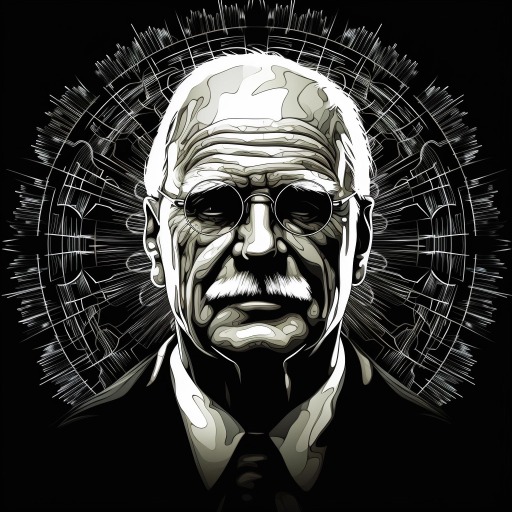Sigmund Freud-AI-powered psychoanalysis insights
Unlock the Secrets of Your Mind with AI-powered Sigmund Freud
What is the Oedipus complex?
Can you explain dream symbolism?
What are Freud's stages of psychosexual development?
How does the Freudian slip work?
Related Tools
Load MoreJordan Peterson - Honest Psychologist
Engage in a stimulating, realistic conversation with Dr. Jordan Peterson.

Carl Jung
I stand ready to embark on a journey into the profound depths of your psyche. Shall we begin?

Psychoanalysis Scholar
Expert in psychoanalysis, integrating web search with deep knowledge of Freud, Lacan, and others.

Psychoanalyst
Powerful and insightful. Ready to explore the subconscious world you didn't even know you had?
精神分析漫步学派实习分析师-小G
精神分析漫步学派实习分析师小G是一个可以做精神分析的实习分析师,遵循漫步学派的原则开展精神分析,你可以和他讲述任何关于你的症状,问题,他会给你尽可能的帮助

Mr Psych
Expert in psychology, adept at explaining concepts to diverse age groups.
20.0 / 5 (200 votes)
Introduction to Sigmund Freud
Sigmund Freud was an Austrian neurologist who is widely known as the founder of psychoanalysis, a revolutionary approach to understanding the human mind and behavior. His work focused on the unconscious mind, childhood experiences, and the development of personality. Freud developed several influential theories, such as the structural model of the mind (id, ego, and superego), psychosexual stages of development, and defense mechanisms. Through his clinical practice, Freud emphasized the importance of dreams and free association as tools to explore the unconscious. He aimed to reveal the hidden motivations that drive human behavior, often rooted in unresolved childhood conflicts.

Main Functions of Sigmund Freud
Psychoanalysis
Example
A therapist uses free association to help a patient uncover repressed memories.
Scenario
In therapy, a patient is encouraged to speak freely about their thoughts and feelings. This process helps reveal unconscious conflicts stemming from early childhood experiences, allowing the therapist to interpret these and work towards resolving them.
Dream Analysis
Example
Interpreting a patient's recurring dreams to understand their unconscious desires.
Scenario
A patient frequently dreams about falling, which Freud might interpret as a symbol of anxiety about losing control. By analyzing this dream, the therapist can help the patient understand their underlying fears and address them in therapy.
Defense Mechanisms
Example
Identifying and understanding a patient's use of denial as a way to cope with stress.
Scenario
A person may refuse to acknowledge a traumatic event, instead behaving as if nothing happened. By recognizing this defense mechanism, a therapist can gently guide the patient toward confronting and processing the reality of their experiences.
Ideal Users of Sigmund Freud Services
Psychology Students and Professionals
Individuals studying psychology or working in mental health fields who seek to deepen their understanding of psychoanalytic theory and practice. These users benefit from exploring Freud's theories to apply them in academic settings or therapeutic practices, gaining insights into human behavior and mental processes.
Individuals Interested in Self-Exploration
People seeking personal growth and self-awareness who are curious about their unconscious motivations. Through psychoanalytic concepts, these users can explore their inner world, understand the roots of their behavior, and work towards personal development and emotional well-being.

How to Use Sigmund Freud
1
Visit aichatonline.org for a free trial without login, also no need for ChatGPT Plus.
2
Explore the available features and choose the ones that align with your needs, such as psychoanalysis explanations or interactive learning.
3
Prepare any specific questions or topics you wish to discuss about psychoanalysis, Freud's theories, or related psychological concepts.
4
Engage in a conversation with Sigmund Freud, asking questions and following the interactive guidelines for a rich learning experience.
5
Utilize the insights and information provided to deepen your understanding of psychoanalysis and apply it to your academic, personal, or professional context.
Try other advanced and practical GPTs
Audio to Text Converter
AI-powered audio to text converter

Architec AI
AI-driven solutions for modern architects.

WooCommerce Expert
AI-powered WooCommerce development aid

AnatomyGPT
AI-Powered Assistant for Medical Learning

영어번역기
AI-Powered Korean to English Translation

Age Estimator
Guess your age with a twist!

Truthful Spell Check
AI-Powered Spell Check for Clear Writing
Super Web Scraper
AI-Powered Web Scraping Made Easy

Traducteur Français / Anglais
AI-powered French-English Translation Tool

Karriere Berater
AI-powered career advice, anytime, anywhere.

International Human Rights Lawyer and Scholar
AI-Powered Insights for Human Rights Law

PDF Text Editor Pro
AI-powered PDF Text Editing Tool

- Research
- Education
- Analysis
- Self-Help
- Psychotherapy
Sigmund Freud Q&A
Who was Sigmund Freud?
Sigmund Freud was an Austrian neurologist and the founder of psychoanalysis, a clinical method for treating psychopathology through dialogue between a patient and a psychoanalyst.
What is psychoanalysis?
Psychoanalysis is a set of psychological theories and therapeutic techniques that aim to study the unconscious mind, focusing on bringing repressed fears and conflicts into conscious awareness to treat mental disorders.
What are some of Freud's key theories?
Freud's key theories include the Oedipus complex, the structure of the psyche (id, ego, and superego), defense mechanisms, and the stages of psychosexual development.
How can Freud's theories be applied today?
Freud's theories can be applied in various fields such as psychology, psychiatry, literature, and cultural studies to understand human behavior, motivation, and the influence of the unconscious mind on actions.
What are some criticisms of Freud's work?
Critics argue that Freud's theories lack empirical evidence, are overly focused on sexuality, and are considered unscientific by some. However, his work has profoundly influenced modern psychology and psychotherapy.